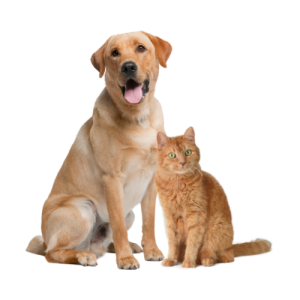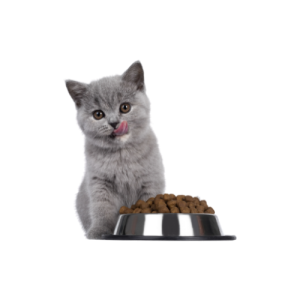Our knowledgeable team can offer support and advice on managing your pet’s weight and diet.
Managing your pet’s weight
If you are concerned that your pet is over or underweight, please book an appointment with our team. It’s important that pets don’t lose weight too rapidly, as this can lead to other health issues. We can provide carefully tailored diet and exercise plans that will help your pet lose weight in a safe and sustainable way.
Body condition scores can also be used to indicate whether a pet is a healthy weight, and our team will be able to help assess your pet and score them.
Is my dog a healthy weight?
- Your dog’s ideal weight will depend on its age and breed, but healthy dogs should have a smooth, obvious waist when looked at from the side and above.
- Their tummy should not bulge out when you feel underneath it, and you should be able to feel their ribs, spine, and hip bones without needing to press in when stroking them – although they shouldn’t stick out.
- There shouldn’t be a build-up of fat where their tail meets the base of their back.
Is my cat a healthy weight?
- Your cat should have an obvious waistline when you look at them from above.
- You should be able to feel your cat’s ribs when stroking its body, but they shouldn’t stick out.
- If your cat is overweight, it will be harder to feel its ribs, as they will be covered by a layer of fat. There may also be fat covering bony areas and a bulge around their abdomen, often with a fat pouch on the underside of their tummy.
Nutrition
We stock a range of foods in practice and can advise you on the best options and products for your pet’s needs. We recommend lifestage feeding, where a pet is fed what they need at each stage of its life.
Kittens and puppies
- This is the major growth period and covers the first one to two years of a pet’s life. The recommendation of which diet, how much, and for how long will vary depending on the breed of your dog, from Chihuahua to Great Dane, and when you have your pet neutered.
- Puppies and kittens need nutritionally balanced food that has the right level of calcium to aid good bone health, and high in easily digestible calories, for growth.
- These diets help growing pets, as they prevent deficiencies and make sure they get everything they need. They can also be fed to a mother in the last trimester of pregnancy and lactation, to ensure that she has all the energy she needs and enough calcium for milk production.
- It is important not to overfeed your puppies and kittens and regular check-ups with the veterinary team during their growth period to get the level of feeding and appropriate diet just right.

Adults
- This stage covers the end of the kitten and puppy stage to the senior years.
- Adults need a balanced diet that contains everything they need, and fewer calories than puppies and kittens to help maintain a healthy weight.
- Neutered pets need less energy, so they might need a specific diet to maintain a healthy weight.
- We stock high-quality pet food that can be tailored to your individual pet’s needs and breed. Whether they have a sensitive tummy, sensitive skin, or extra dental needs we have you covered.
Seniors
- Senior cats are over seven to nine years old.
- Due to the variation in life expectancy between different breeds of dogs, the senior stage can start at 12 years old for small dogs, 10 for medium dogs, and eight for large dogs.
- Senior food usually contains less calories and a blend of vitamins, minerals, and supplements to support the immune system and help kidneys and joints.
- Senior pets are usually less active, so reduced calories stop excessive weight gain and strain on the joints.
- If your senior pet has any other health conditions, we can also offer advice on how to manage this with the right diet.
Pregnant and nursing
It’s important to feed higher-calorie food during the last trimester of pregnancy and throughout the lactation period, to prevent weight loss and to help the production of high-quality milk.
Get in touch to learn more, purchase food, or book an appointment for your pet.

